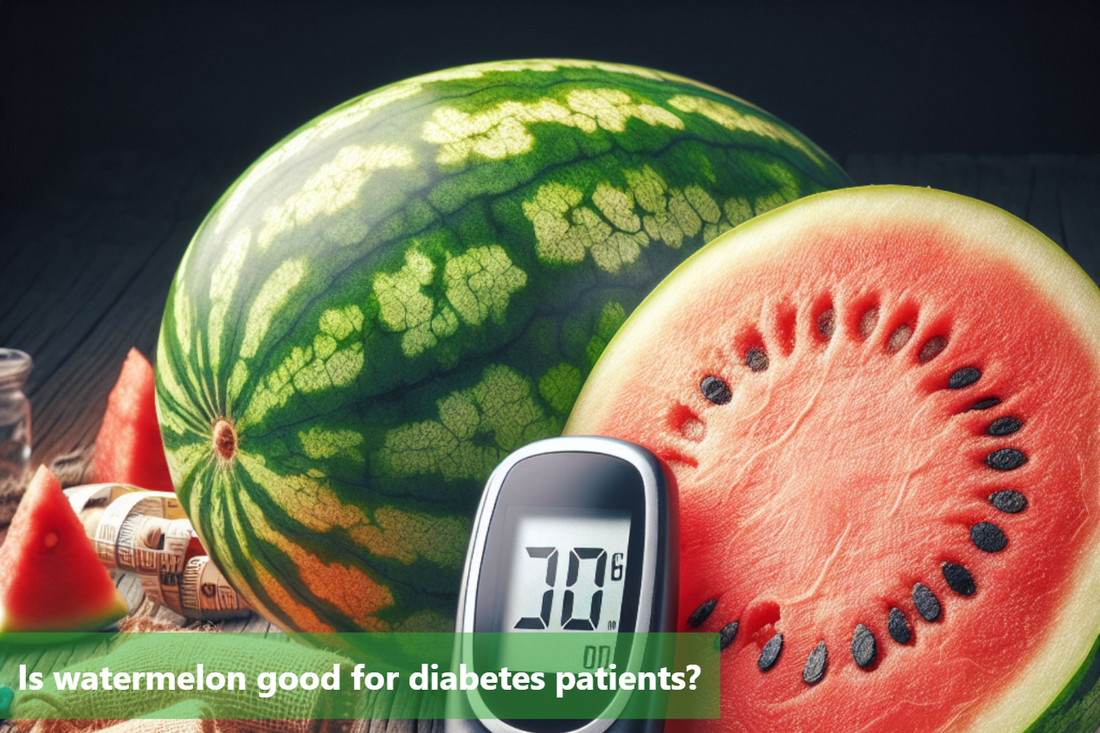Diabetes is a common health condition with high blood sugar levels, affecting millions worldwide. Watermelon is a popular fruit known for its refreshing taste and high water content. The debate on whether watermelon is good for diabetes patients has piqued interest. Dietary choices are crucial in diabetes management. Some argue watermelon's natural sugars can spike blood sugar, while others focus on its nutrients and health benefits. Understanding this debate is important for informed decisions on diet and well-being. Exploring scientific evidence aims to clarify the link between watermelon and diabetes management, separating fact from fiction for better dietary choices.
Nutritional Benefits of Watermelon
-
Immune System Support: Watermelon is high in vitamin C, which is essential for a healthy immune system.
-
Vision Health: Rich in vitamin A, watermelon promotes good vision and overall eye health.
-
Blood Pressure Regulation: The potassium content in watermelon helps regulate blood pressure and muscle function.
-
Antioxidant Power: Lycopene, an antioxidant in watermelon, reduces oxidative stress and inflammation, benefiting heart health.
-
Hydration Booster: With its high water content, watermelon aids in hydration, especially in hot weather or after physical activity.
-
Nutrient-Rich Snack: Watermelon is a guilt-free snack that satisfies sweet cravings while providing essential vitamins and minerals.
Incorporating watermelon into your diet can enhance your overall well-being and support a healthy lifestyle.
Nutritional Value of watermelon
The nutrients in 2/3 cup (100 grams) of raw watermelon are:
|
Calories |
30 |
|
Water |
91% |
|
Protein |
0.6 grams |
|
Carbs |
7.6 grams |
|
Sugar |
6.2 grams |
|
Fiber |
0.4 grams |
|
Fat |
0.2 grams |
Impact of Watermelon on Blood Sugar Levels
-
High Glycemic Index (GI): Watermelon has a high glycemic index, typically around 72. This means it can cause a rapid spike in blood glucose levels after consumption.
-
Low Glycemic Load (GL): Despite its high GI, watermelon has a low glycemic load (GL) of around 5 per 100-gram serving. GL considers both the GI and the carbohydrate content, indicating that a typical serving size may have a more moderate impact on blood sugar levels.
-
High Water Content: Watermelon is approximately 90% water, which can dilute its sugar content and contribute to a feeling of fullness without adding excessive calories or sugars.
-
Natural Sugars: Watermelon contains natural sugars, mainly fructose, which can affect blood sugar levels. A typical serving size (one cup, about 154 grams) contains around 9.4 grams of sugar.
-
Fiber Content: Watermelon has a low fiber content, about 0.6 grams per 100 grams. Low fiber means there is less moderation of sugar absorption, which can contribute to quicker spikes in blood sugar levels.
Eating watermelon in moderation doesn't make blood sugar levels worse. But, it's essential to check how your body reacts and talk to a doctor or nutritionist to decide how much watermelon to eat. To sum up, even though watermelon can increase blood sugar levels quickly because of its glycemic index, eating it in moderation and watching portion sizes can let people with diabetes enjoy this fruit while keeping a balanced diet.
Moderation and Portion Control
-
Portion Control: Limit portion sizes to a small amount, such as one cup of diced watermelon, to manage its impact on blood sugar levels.
-
Pair with Protein or Healthy Fats: Combine watermelon with protein-rich foods like cheese or nuts to slow down the absorption of sugars and balance its glycemic impact.
-
Monitor Blood Sugar Levels: Check your blood sugar levels before and after consuming watermelon to understand its specific impact on your body and adjust your intake accordingly.
-
Consider Timing: Consume watermelon as part of a balanced meal or snack to mitigate its effects on blood sugar levels.
-
Whole Fruit vs. Juice: Choose whole watermelon over watermelon juice to benefit from its fiber content, even if minimal, and avoid the concentrated sugars found in juice.
Bottom line:
After exploring the debate on watermelon for diabetes, it's clear that it can be part of a diabetic diet in moderation. Despite being sweet, its low glycemic index and high water content make it safe for diabetics in proper portions. Watermelon provides vitamins, minerals, and antioxidants for overall health, so enjoy it in moderation. Consult a healthcare provider or dietitian for personalized advice. Ultimately, watermelon can be a tasty and nutritious addition to a diabetic meal plan.
DiabeSmart is the first food range exclusively crafted for diabetics. Enjoy clinically tested, delicious products that let you keep your favorite food habits while managing your blood sugar levels effortlessly.
FAQs:
-
Can diabetics eat watermelon?
Yes, diabetics can enjoy watermelon in moderation as it is a low glycemic index fruit.
-
Does watermelon raise blood sugar levels?
Watermelon has a high water content and fiber, which can help regulate blood sugar levels.
-
How much watermelon can a diabetic person eat?
It is recommended for diabetics to consume watermelon in moderation, typically around 1 cup serving size.
-
Is watermelon a healthy option for managing diabetes?
Watermelon can be a healthy choice for diabetics due to its vitamins, minerals, and antioxidants that support overall health.
-
Are there any precautions to consider when consuming watermelon with diabetes?
Diabetics should monitor their blood sugar levels when eating watermelon and ensure it fits into their overall meal plan.
This Blog post is an initiative by DiabeSmart, to provide accurate and Nutritionist / Doctor approved information related to Diabetes. DiabeSmart is India's first Food brand designed specifically for Diabetics, that has been clinically tested on Diabetics and Pre-Diabetics to deliver 55% - 70% lower Sugar spikes. DiabeSmart is part of Lo! Foods - India's leading brand for Everyday Functional Health foods.















